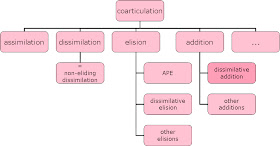In my blog posting of the 9th of July I wrote about non-eliding dissimilation.Today I would like to draw your attention to what I call dissimilative addition.
Dissimilation describes the result(s) of avoiding two similar or identical sounds to be in relatively close proximity in the
- We can try to avoid having a second similar sound to appear. Take the plural form <boys>.We write <the boys' clubs association> and regularly pronounce the noun <boys'> as /bɔɪz/. Thus we avoid a second /z/ to appear in close proximity to the first one. There is no dissimilation visible in the surface form of the word. (On the other hand, in <Charles'(s) car> we are free to choose between /ʧɑːlzɪz/ and /ʧɑːlz/.)
- Take the ordinal number 6th, written <sixth> and pronounced as /sɪksθ/, but sometimes also as /sɪkst/. In both pronunciations we have a word-final cluster of three consonants, which is quite a mouthful. In /sɪksθ/ two fricatives abut which are are both voiceless and very similar as regards their place of articulation. To cut corners, some speakers use the form with the final /t/, thus making the two consonants less similar. There are still three consonants, none is elided, so I call it non-eliding dissimilation. (see my blog posting of the 9th of July)
- Some speakers say <Febuary> for <February> or <libary> for <library>. One of the two r-sounds is deleted. This is what Jack Windsor Lewis terms dissimilative elision and what John Maidment calls dissimilatory elision. I already promised to write about this process in a future blog posting.
- And there is another way to avoid having two similar/identical sounds to be too close together: Dissimilative addition.
1. One /kɪs/, two */kɪs s/? No, we must say /kɪsɪz/. Otherwise, two identical sounds would be too close together. So an intervening sound is inserted. The same dissimilative process can be demonstrated with the genitival form <kiss'> and the 3rd person singular as in <he kisses>.
2. I /weɪt/, but I /weɪtɪd/. Again a sound is added to push two similar sounds apart.
3. As we all know, there are two variants of the indefinite article; one of them is used with a noun beginning with a consonant, the other one is placed before a noun with a vocalic onset. Thus we get <a cuckoo> and <an owl>.
 | |
| credit: Nina Valetova | |
| title: Assimilation and Dissimilation |

Kraut, isn't it usually "chaîne", with a circumflex?
ReplyDeleteYes, of course! Thanx! Three years of French at school were totally insufficient.
ReplyDeleteBitte sehr!
ReplyDeleteBut that doesn't take two important rules into account:
ReplyDelete1. In an English text, accents in loan words (fiance, nee) are optional, in fact discouraged by some.
2. For words and phrases that aren't part of the English language yet, the accent should be at least one letter off (Haüser, chatêau), and those that haven't one in the original must sport one rather randomly (the German Bündeskanzler/Bundeskänzler).
Haha: Frau Bündeskanzler /mɜːkl̩/
ReplyDeleteI don't recognise the 'sixt' pronunciation of 'sixth'. I'm only familiar with the common 'sikth'.
ReplyDeleteI personally only go for the two syllable version of "Charles's" (and similar), but I know what you mean. Only last night I heard a priest on Radio 4 pronouncing "Jesus's" with two syllables. Was that idiosyncratic, I wonder, or vocational? Can't say I've sat through many sermons in my life, so I wouldn't know!
ReplyDelete@Paul Carley: One always has to take into account personal preferences.
ReplyDelete